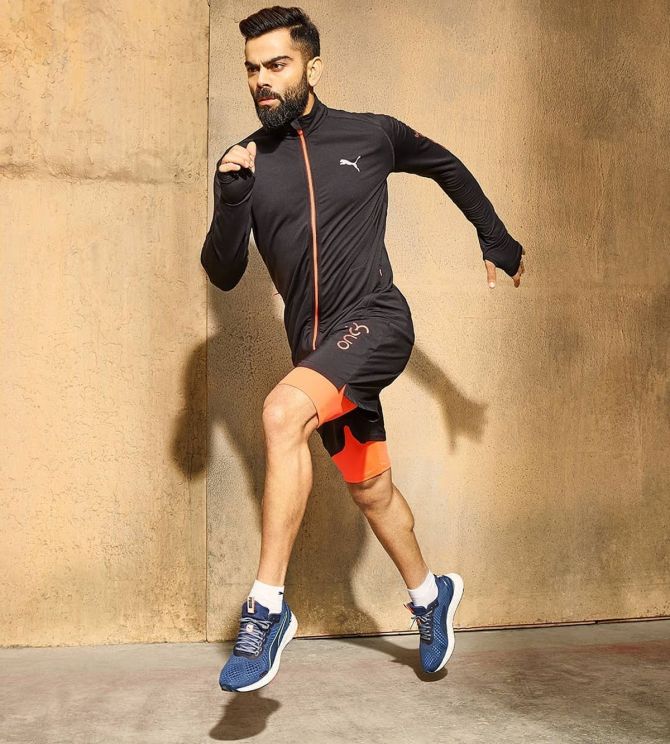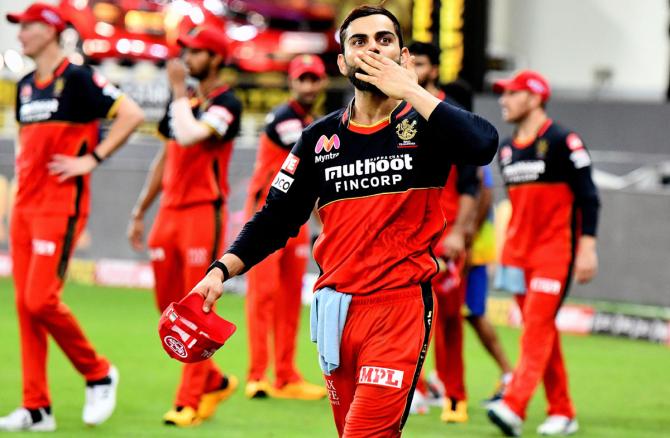 | « Back to article | Print this article |
'RCB is a natural choice for us, mainly due to our long-standing association with Virat Kohli.'

Puma announced a three-year kit sponsorship deal with Indian Premier League franchise Royal Challengers Bangalore.
The deal, the value of which was not disclosed, will give Puma exclusive rights to retail RCB merchandise.
Abhishek Ganguly, managing director, Puma India and Southeast Asia, talks to Dhruv Munjal about the partnership, how the company has dealt with the pandemic, and why it continues to be the dominant force in the Indian market.
What were the reasons behind tying up with RCB?
Having exited the IPL a few years ago, we wanted to get back to sponsoring a franchise.
RCB is a natural choice for us, mainly due to our long-standing association with Virat Kohli.
Additionally, our research, which involved viewership, social engagement, etc, showed that RCB is among the most popular teams around.
Moreover, we realised that we have a robust distribution network in Karnataka, which will give us the ideal opportunity to strengthen our sports merchandising business.
In the past, Puma has sponsored Rajasthan Royals and Deccan Chargers. Why such a long break from the IPL?
Sports merchandising through team kits has been a difficult business in India.
The decision to move away from the IPL was mainly driven by the fact that at the time, Puma was still trying to establish itself in India.
We thought of focusing our energies on individual cricketers -- apart from Kohli, K L Rahul is also a Puma athlete -- instead of teams.
Now, with a larger reach in the market, coupled with how the IPL has grown into such a powerful property, we saw this as a good time to come back.
Puma was also believed to be in the running for the kit sponsorship of the Indian team, which MPL Sports eventually bagged. What happened there?
It was considered but we opted not to bid. We thought we'd be better off investing our resources elsewhere. (Apparently, the Board of Control for Cricket in India wanted the same sum offered by outgoing sponsor Nike, an amount that none of the big sportswear companies interested was willing to pay.)
Kohli is undoubtedly the biggest star in Indian sport today. How has he helped Puma pull away from its rivals?
It has been a fabulous partnership. Our collaborative brand, One8, which was launched three years ago, has been a runaway success.
More than that, he has given a massive push to our overall brand strength in the market.
Some of the campaigns that we've done, for instance, have not only been about driving sales but have also been aimed at inspiring upcoming athletes.
Kohli enjoys a phenomenal connection with the youth.
How has Puma dealt with the pandemic?
We have 370 retail stores in India, so the challenges have been immense.
Thankfully, we were able to bounce back quickly because the pandemic made people understand the importance of staying fit.
With more people running and training, there has been great demand for our products.
Sales on the official Puma Web site have tripled since the pandemic started.
So there is demand, but in order to deliver, we must pay close attention to our supply chains and distribution networks, as well as look after our retail partners. You need a lot of care in these times.

Puma has been reliant on its physical stores for sales. Will we now see a more aggressive online push?
E-commerce has gained considerably in the last one year.
We can see more penetration, but overall, we see ourselves as a multi-channel brand.
We want our customers to be able to shop at the channel of their choice.
Hence, we will not put one over the other.
We continue to place a strong focus on our physical stores and work closely with partners like Shoppers Stop and Lifestyle.
At the same time, we've invested heavily in e-commerce portals such as Myntra.
Despite entering the market relatively late -- in 2006 -- Puma has established itself as the top sportswear label in India. What makes you tick?
Two reasons stand out. The first is consumer centricity.
We've always emphasised on giving a great experience to the consumer, and understanding the psyche of the Indian shopper.
And second has been the quick adoption of e-commerce.
Whether it's social media marketing or picking out the right influencers, we've used technology in all business processes, from supply chain management to customer outreach, very efficiently.
Outside of cricket, you've partnered with clubs like Bengaluru FC and Mumbai City FC in the Indian Super League. Will we see more expansion on that front?
As a market leader, we believe that India cannot be a one-sport nation.
We've seen a shift in India's sporting culture in the last five years, and it's our responsibility to further this push.
Right now, we're working closely with grassroots footballers, as well as promoting track-and-field athletes like Dutee Chand.
Mary Kom is another of our brand ambassadors.
There is a huge change coming in the next 10 years.
Feature Presentation: Rajesh Alva/Rediff.com